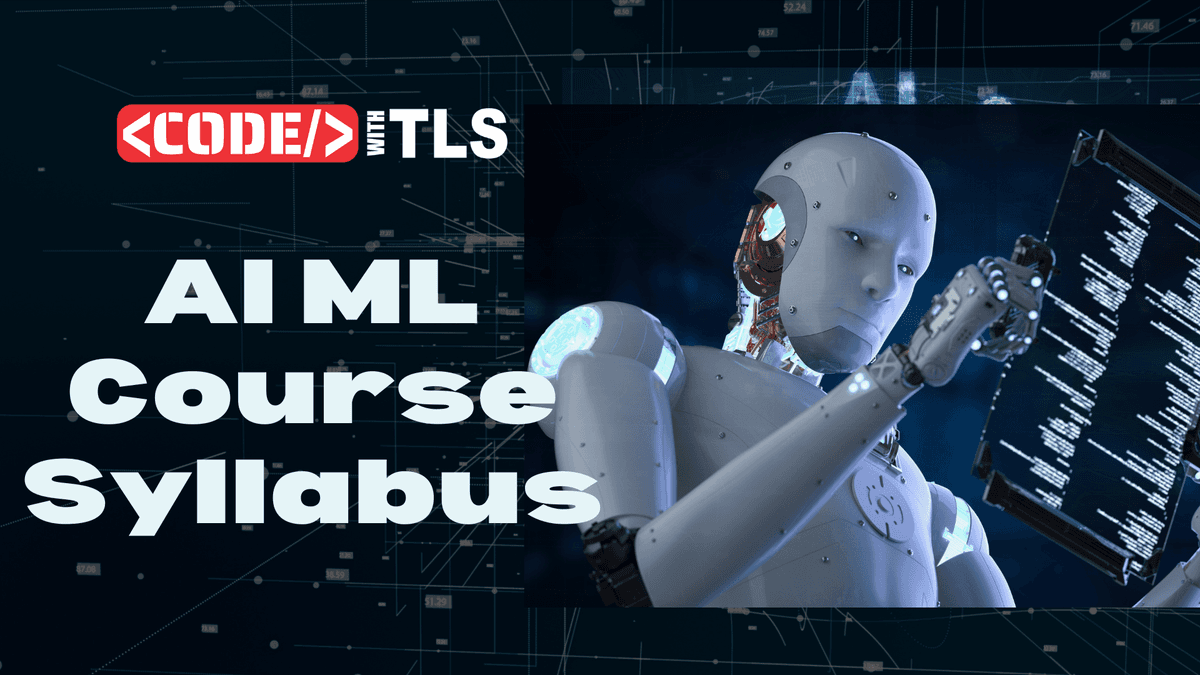

AI & ML Course Syllabus: What to Expect and How TLS Can Accelerate Your Learning
Published: 2024-12-06 13:20:07
As Artificial Intelligence (AI) and Machine Learning (ML) continue to dominate the tech landscape, more individuals are looking to enter this rapidly growing field. Whether you're an aspiring data scientist, AI engineer, or machine learning specialist, choosing the right course syllabus is crucial for acquiring the skills necessary to succeed. AI and ML programs vary widely, from certification courses to diploma and degree programs, with each offering a distinct learning path. In this blog, we will explore the key modules you can expect in an AI and ML course syllabus, the role of project-based learning and capstone projects, and the variations across different course formats. We’ll also examine how learning with Code With TLS can help you master the syllabus and equip you with real-world skills.
Key Modules in AI and ML Courses
A comprehensive AI and ML course syllabus is typically structured to cover both foundational concepts and advanced techniques. Below are the primary modules you will encounter in most AI and ML courses:
1. Machine Learning
Machine learning is the core of AI and involves building algorithms that enable systems to learn from data and make predictions or decisions. This module introduces the fundamental concepts and types of machine learning algorithms, which include:
- Supervised Learning: Involves training algorithms on labeled datasets to predict outcomes. Popular algorithms covered include linear regression, decision trees, support vector machines (SVM), and k-nearest neighbors (KNN).
- Unsupervised Learning: Focuses on identifying patterns in data without predefined labels. Common algorithms include clustering (e.g., k-means, hierarchical clustering) and dimensionality reduction techniques (e.g., principal component analysis or PCA).
- Reinforcement Learning: This is an advanced topic where agents learn by interacting with an environment and receiving feedback through rewards or penalties.
By the end of this module, you will understand how to build and evaluate machine learning models and make predictions based on data.
Read More:
AI Tools for Digital Marketing 2025
Android App Development Certification Course
Become a Successful Business Intelligence Analyst
Contact our counselors for a free consultation today.
2. Deep Learning
Deep learning is a subfield of machine learning that uses neural networks with multiple layers (hence the term "deep") to learn from vast amounts of data. This module dives into neural networks and deep learning techniques that power state-of-the-art applications such as image recognition, natural language processing (NLP), and self-driving cars. Key topics include:
- Neural Networks: Introduction to the basic architecture of neural networks, including nodes, layers, and activation functions.
- Convolutional Neural Networks (CNNs): Primarily used in image and video processing, CNNs are crucial for tasks like image classification and object detection.
- Recurrent Neural Networks (RNNs): Used for time series data and sequence modeling, such as speech recognition, text generation, and language translation.
- Generative Adversarial Networks (GANs): This technique is used for generating new data that mimics real data, commonly used in image generation, video editing, and creative AI applications.
This module will give you the ability to design, train, and deploy deep learning models for a wide range of applications.
3. Natural Language Processing (NLP)
NLP is a branch of AI that focuses on the interaction between computers and human language. Given the importance of NLP in virtual assistants (like Siri and Alexa), machine translation, and sentiment analysis, this module covers:
- Text Preprocessing: Techniques such as tokenization, stemming, and lemmatization for preparing raw text data for analysis.
- Word Embeddings: Models like Word2Vec and GloVe that convert words into numerical representations, enabling machines to understand the semantic meaning of words.
- Sequence Models: Using RNNs and LSTMs (Long Short-Term Memory networks) to handle tasks such as language modeling and text generation.
- Transformers: A breakthrough in NLP architecture that powers models like GPT-3, BERT, and T5, which have revolutionized the accuracy and performance of NLP applications.
In this module, you will gain hands-on experience with text data, learning how to implement and fine-tune models that understand and generate human language.
Project-Based Learning and Capstone Projects
One of the most effective ways to learn AI and ML is through project-based learning. In this approach, students apply their theoretical knowledge to real-world problems, building AI models and machine learning applications from the ground up. It helps reinforce learning, boosts problem-solving abilities, and provides a portfolio of work to showcase to potential employers.
Capstone Projects are typically at the end of the course and allow students to demonstrate their comprehensive understanding of AI/ML concepts. These projects are often more complex and interdisciplinary, requiring students to integrate different algorithms, data sources, and tools. Capstone projects may include:
- Predictive Modeling: Using machine learning techniques to predict customer behavior, stock prices, or sales trends.
- Image Recognition: Building a deep learning model for classifying images or detecting objects within them.
- Natural Language Processing: Developing chatbots, language translators, or sentiment analysis tools using advanced NLP techniques.
The hands-on experience gained from these projects is invaluable, and it also provides a practical way for students to showcase their skills to future employers.
Latest Updates:
Benefits of Digital Marketing Course
Best Digital Marketing Course in India
Best Digital Marketing Institute in Delhi
Best Mobile App Development Course
Best Mobile App Development Course Certification
Best Programming Languages to Learn 2025
Variations in Syllabus for Certification, Diploma, and Degree Courses
AI and ML courses vary in depth and scope, depending on the type of certification or program you are pursuing. Here’s how the syllabi differ across certification, diploma, and degree courses:
1. Certification Courses
AI/ML certification programs are typically short-term, intensive courses that focus on providing practical skills in a condensed time frame. These courses usually span 3-6 months and focus on hands-on projects and core skills, such as:
- Basic machine learning algorithms (linear regression, decision trees, etc.)
- Introduction to deep learning (including neural networks and CNNs)
- Basic NLP techniques
- Practical use of tools like Python, TensorFlow, and PyTorch
Certification programs are ideal for professionals looking to quickly upskill or pivot to a career in AI/ML without committing to long-term study.
2. Diploma Courses
Diploma programs in AI/ML tend to offer a more in-depth study than certification programs, lasting anywhere from 6 months to a year. These programs typically cover:
- Advanced machine learning algorithms (ensemble methods, boosting, bagging)
- Deep learning in more detail, including advanced neural networks (RNNs, GANs)
- NLP, with a focus on modern techniques like transformers
- Hands-on projects and capstone projects to build a portfolio
Diploma courses are ideal for individuals who wish to pursue AI/ML as a serious career and need a more structured, comprehensive learning path.
3. Degree Programs (Bachelors or Masters)
Degree programs in AI/ML, such as a Bachelor’s or Master’s in Artificial Intelligence or Data Science, offer the most thorough and detailed syllabus. These programs span 2-4 years and cover:
- A deep dive into the theoretical foundations of AI and ML
- Advanced topics like reinforcement learning, robotics, and computer vision
- Extensive mathematics, including calculus, probability theory, linear algebra, and statistics
- Research opportunities and academic papers
- Internships or industry collaborations for hands-on experience
Degree programs are suited for those looking to build a long-term career in AI or pursue roles in academia or research.
How Code with TLS Can Help You Master the AI/ML Syllabus
Learning AI and ML requires not only a strong theoretical foundation but also the ability to implement these concepts in real-world scenarios. This is where Code With TLS can play a pivotal role in helping you master the AI/ML syllabus. Here’s how Code With TLS can accelerate your learning:
- Comprehensive Curriculum: Code with TLS offers a well-rounded AI/ML curriculum that covers all key modules, including machine learning, deep learning, and NLP. With a focus on both theory and practical applications, Code With TLS ensures you gain a complete understanding of the field.
- Project-Based Learning: Code with TLS incorporates real-world projects into the learning experience, allowing you to apply what you’ve learned in a hands-on way. Whether it’s building predictive models or creating neural networks, you’ll gain practical skills that employers value.
- Expert Mentorship: Code With TLS, you will be guided by industry professionals who provide mentorship, share insights, and answer questions, ensuring you stay on track and deepen your understanding of complex topics.
- Capstone Projects: Code with TLS offers capstone projects that help you demonstrate your knowledge and build a portfolio of work, making you stand out to potential employers.
- Flexible Learning Paths: Whether you're pursuing a certificate, diploma, or degree, Code With TLS offers tailored learning paths that match your needs, ensuring you gain the necessary expertise at your own pace.
Also Read:- Top ai ml jobs in india
AI Machine Learning Courses Faqs
Conclusion
The AI and ML syllabus is designed to provide a balanced learning experience, covering everything from machine learning fundamentals to advanced deep learning and NLP techniques.
By engaging in project-based learning and completing capstone projects, you’ll not only grasp theoretical concepts but also acquire the hands-on experience needed for real-world applications.
Whether you opt for a certification, diploma, or degree program, Code with TLS offers an excellent platform to accelerate your learning and gain the skills necessary to thrive in this exciting field. With expert mentorship, a comprehensive curriculum, and practical projects, Code With TLS helps bridge the gap between learning and applying AI/ML skills in today’s competitive job market.


